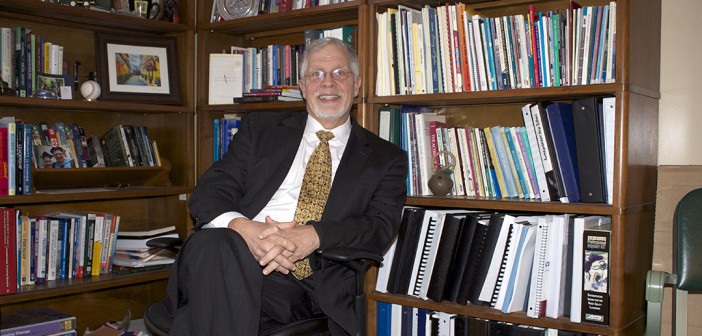Although he is a graduate professor at Lehigh by day, Dr. George White’s free time is spent influencing public policy. More specifically, he deals with kindergarten-through-12th-grade public education issues.
Professor White has been working on a transition team for Pennsylvania’s newly-elected Gov. Tom Wolf. White was one of two members on the team chosen from a four-year, higher-education background.
White has often worked in community and civic engagement and runs the center for developing urban educational leadership in the College of Education at Lehigh.
Professor White’s involvement in the creation of Pennsylvania policy began early during the governor primaries. White and members of the Lehigh Department of Education invited Wolf to come and spend a morning with them last semester.
“He did, no cameras, no press,” White said. “It was a fact-finding mission on his part. It was not a political trip, and I think he felt very good about it.”
Later joining Wolf’s education team, White explained the purpose of the committee, saying, “Our responsibility initially was to provide advice and support to the governor in terms of helping him establish priorities for the early stages of his tenure.”
Additionally, White emphasized the significance of the nomination of Pedro Rivera, co-chair of the committee and superintendent at Lancaster school district, for the Pennsylvania Secretary of Education. White said this nomination is highly pertinent to the committee’s goals.
“The sense of the committee is that because (the superintendent) was intimately involved in the development of this work, that the priorities that we put forth to the governor will be priorities that will be looked at pretty heavily,” he said. “They’ll definitely get a fair hearing, there’s no question about that.”
The team proposed a list of priorities for the committee by the day of Wolf’s inauguration. However, White said the ways in which they will handle politics will vary. Among the list of priorities submitted to Wolf, the primary focus was on the proposed creation of a new funding formula for the school districts.
“(We) need (a) more efficient and thorough funding formula to fund K-12 education,” White said. “The state has been without a funding formula for 12 years and it’s been sort of ‘whatever’s in the pot gets allocated out,’ instead of having a comprehensive approach. Given the fact that the governor has made this one of his major campaign issues, there’s high hope that we will get a fair and equitable funding system in place.”
Bethlehem superintendent, Joseph Roy, shared similar sentiments on the new governor.
“Probably the hottest topic in Pennsylvania education politics is the fair funding formula,” Roy said. “You talk about the impact of poverty…(Rivera) knows about it…. I’m excited we’ll have a secretary who gets it.”
The main focus of this funding formula is on low-income environments.
“Right now, we have a very disparate model that exists where a kid in a local school district, suburban district, may, over the course of a year, have between three and four thousand (dollars) per kid more spent on him than they would in a Bethlehem or an Allentown or an Easton,” White said. “If you multiply that number by the number of kids and the number of years that a kid is in school, all the sudden we’re talking real dollars that impact equity of opportunity. And that’s what it is, equity of opportunity.”
Some 25 years ago, White served as a superintendent. As it pertains to his work now, he described how he felt wrong that his district would have significantly more funding than others, and that children just like his own were being deprived of an equal education due to their placement in society.
The main point of debate for the proposed funding formula is how it will be funded. White explained that there is a proposal to have the funds come from extraction fees on natural gas. White said that Pennsylvania has the lowest extraction tax rate in the country. The proceeds from the 5 percent tax would be used for environmental protection and education.
In terms of White’s academic life, he explained that he is now able to incorporate his experience with public policy into the classroom and can provide real-world examples.
“He certainly has gotten Lehigh and Lehigh students involved in the community,” said Judith Lasker, professor of sociology and anthropology at Lehigh. “I think those are positive things.”
As for Lehigh playing a role in helping eliminate inequity, White said Lehigh students have been good with working in the local community in terms of tutoring and other programs.






Comment policy
Comments posted to The Brown and White website are reviewed by a moderator before being approved. Incendiary speech or harassing language, including comments targeted at individuals, may be deemed unacceptable and not published. Spam and other soliciting will also be declined.
The Brown and White also reserves the right to not publish entirely anonymous comments.